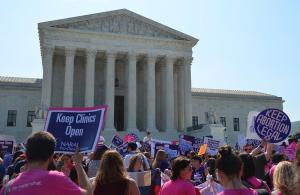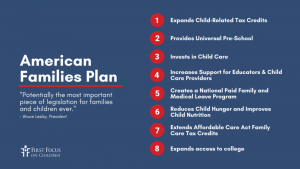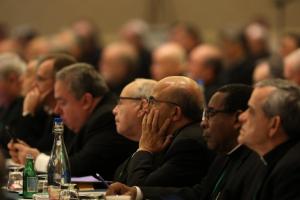

Will Roe v Wade survive the Supreme Court’s consideration of Alabama’s strict abortion law?
Four New York Times writers hashed over the Supreme Court justices’ arguments on the first day of deliberations in Dobbs v. Jackson Women’s Health Organization. The case involves a Mississippi law banning nearly all abortions after 15 weeks. It may also involve the fate of Roe v. Wade, the 1973 Supreme Court decision that protects a woman’s right to choose abortion without undue government restriction. The 1973 court also ruled that the right to an abortion is not absolute. Governments have an interest in protecting both women’s health and prenatal life.
This post will take a mosstly conservative, pro-life stance on legal issues surrounding abortion. But in this country pro-life and conservative are not the same thing. There are other pro-life issues – gun control, nuclear deterrence, and, most prominently, the Covid-19 pandemic and climate change. And abortion itself requires much more than a legal response.
A pro-lifer and three pro-choice writers debate in the Times.
The headline of the Times article featuring the four debaters ends with what may be their consensus: “My Guess is They Overturn” Roe v. Wade. Discussing the court’s proceedings were columnists Michelle Goldbert, Charles M. Blow, and Ross Douthat along with opinion podcast host Lulu Garcia-Navarro. Douthat, a Catholic, alone voiced qualified support for advancing legal protection for pre-born life.
Much of their debate, as well as much of the arguing in the court, at least from the liberal side, concerned the court’s reputation. What if justices set aside nearly a half century of precedent and decide to overturn Roe? Would the Supreme Court be merely a third branch of party politics? What would be left of that supposedly independent check on the two elected branches of government?
Lost in the Times debate and mostly smothered in the court arguments was a compromise suggestion by Chief Justice John Roberts. He noted that Mississippi’s 15-week ban on abortions was similar to “the standard that the vast majority of other countries have.” In other words, the right to an abortion in this country is exceptionally broad. We’re an outlier among the nations. But Roberts doesn’t lead the court anymore. Would the court’s other five conservatives be content with a narrow ruling? Would they settle for leaving Roe in place while granting states additional power to determine when the state’s interest in pre-natal life overrides the privacy concerns of the mother?
Douthat responds to Goldberg …
The highlight of the debate, for me, was an exchange between Ross Douthat and Michelle Goldberg. Goldberg spoke of hoping that her daughter would grow up in a less misogynistic world. Instead, she expects to experience, for the first time, a loss of women’s rights. She meant one lost right in particular,the right to terminate a pregnancy.
Douthat responded, somewhat less than gently:
And I suppose I would be grateful for the opportunity to build a society that does not assume that my three daughters’ status as equal human beings depends, practically or constitutionally, on their right to kill their own unborn children in utero.
Other debaters immediately pounced on the suggestion that we know when a human person begins to exist. That’s a question that the Supreme Court from the beginning recognized as central, while also acknowledging its own incompetence to answer it. It preferred, instead, to draw lines to indicate when and to what extent the state may step in – which is a kind of answer, anyway.
Goldberg followed up with two ideas, the second more cogent and relevant than the first. She says, first,
…in the absence of legal abortion, society may be forced to adapt to the demands of childbearing. But none of that changes the existentially degrading and terrifying possibility of being forced to go through pregnancy and birth against your will.
There are times when a woman is “forced” to undergo that essentially and existentially “degrading and terrifying” circumstance. Those would be cases of rape and incest. In his answer Douthat acknowledged that much and allowed for abortion in those cases. Otherwise, it’s hard to see women being forced to undergo pregnancy.
Goldberg’s stronger point concerns what pregnancy can sometimes do to a woman’s body. She references her own difficult pregnancies and the fact that not everyone can afford the “thousands of dollars” it cost her to recover after giving birth to her two “very wanted kids.”
… and challenges conservatives.
Douthat picks up on Goldberg’s suggestion about societal support for childbearing women and then speaks to the anti-abortion movement. His answer is worth quoting in full:
There are absolutely limits to what even the most generous society can do to help women carry those burdens; part of that burden is irreducible and nontransferable. But once the child exists, outside of the cases where its imposition is literally forced on the women — rape and incest — the just society has to put all its efforts toward making the experience something other than degrading and terrifying, not toward using lethal violence. And in many, many cases that end in abortion right now, what makes the situation terrifying is material circumstances, not the child itself. This is where conservatives have not done enough, and should and must do more, to lift or ease those burdens, including on basic issues like maternal care that affect all pregnancies, wanted and unwanted and in between.
The preeminent issue?
A recent survey finds that 40 percent of women who have had abortions cite financial hardship as their reason. That’s less than I would have thought, but even so it’s remarkable. For a variety of reasons U.S. abortions have declined by about half from the 19 80’s. I suppose anti-poverty efforts, increased availability of contraceptives, and the sometimes strident sometimes respectful voices of anti-abortion activists all contributing to this decline. Imagine eliminating another 40 percent of abortions, not by legal restrictions or shouting but simply by being the kind of child-supporting society we ought to be.
In that case conservative American bishops would find it harder to label abortion the “preeminent” issue of our time. Not when the number of U.S. deaths from Covid-19 is edging toward a million, most of them unnecessary. Not when estimates of lives to be saved worldwide by an appropriate response to global warming center around a billion over one or two centuries. Breaking that down, it’s five to ten million a year. And, numbers of deaths aren’t the only negative consequences of Covid and global warming.
I need to say much more about whether abortion or something else is the preeminent pro-life issue of our time. Or whether it’s reasonable to make such a determination.












